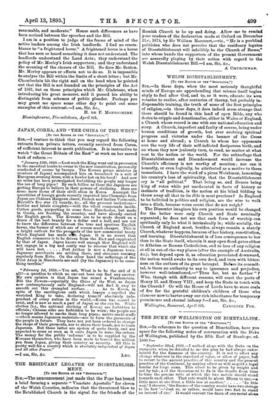WELSH DISESTABLISHMENT.
[To Taw EDITOR or TRH " SPZOTATOR:1 SIR,—In these days, when the most seriously thoughtful minds of Europe are apprehending that science itself begins shyly to feel after God, and to, as it were, educate its own votaries to realise, after centuries of thorny, but probably in- dispensable training, the truth of some of the first principles of religion,—in these days, it does indeed seem strange that there should be found in this land of open Bible, any who desire to cripple and denationalise, either in Wales or England, a Church whose record is one with our national education and story. A Church, imperfect and faulty of course, being under human conditions of growth, but ever evolving spiritual progress and victories under the banner of the Cross at home and abroad ; a Church to whom her opponents owe the very life of their self-inflicted fissiparous birth, and on whom they now jealously turn, to rend, no matter at what cost to the nation or the world. For the subterfuge that Disestablishment and Disendowment would increase the Church's efficiency is not worthy of mention ; nor can it honestly, or even logically, be attributed as a motive to these iconoclasts. I have the word of a pious Welshman, lamenting his country's loss of spirituality, that the Disestablishment cry is "all political." That being so, and Demos being king of votes while yet uneducated in facts of history or instincts of tradition, is the nation at his blind bidding to throw away all that to its Elite is most precious ? Is England to be belittled in politics and religion, are the wise to walk into a ditch, because votes count that do not weigh ?
The Dissenter imagines his own position would be changed for the better were only Church and State nominally separated ; he does not see that each form of worship can spiritually only be what it intrinsically is ; while socially, the Church of England must, besides, always remain a stately Church, whatever happens, because of her history, constitution, and learning. Disestablishment is of less consequence to her than to the State itself, wherein it may open flood-gates either to Atheism or Roman Catholicism, and to loss of any religion at all in out-of-the-way places (after the example of Australia, &c.); but depend upon it, as education percolated downward, the nation would awake to its own deed, and turn with bitter- ness on the authors of its great betrayal. Before its commit- tal, is there no authority to say to ignorance and prejudice, however well-intentioned,—" Thus far, but no farther " ? Who, though with different reasons, will react the parts of Henry IL and Henry VIII., and keep the State in touch with the Church P Or will the House of Lords have to store coals of fire for the grateful children's children of those who clamour now to barter away our rich inheritance for temporary prominence and eternal infamy P—I am, Sir, &o., Wellington, Somerset, April 8th. CAROLINE Fox.


































 Previous page
Previous page